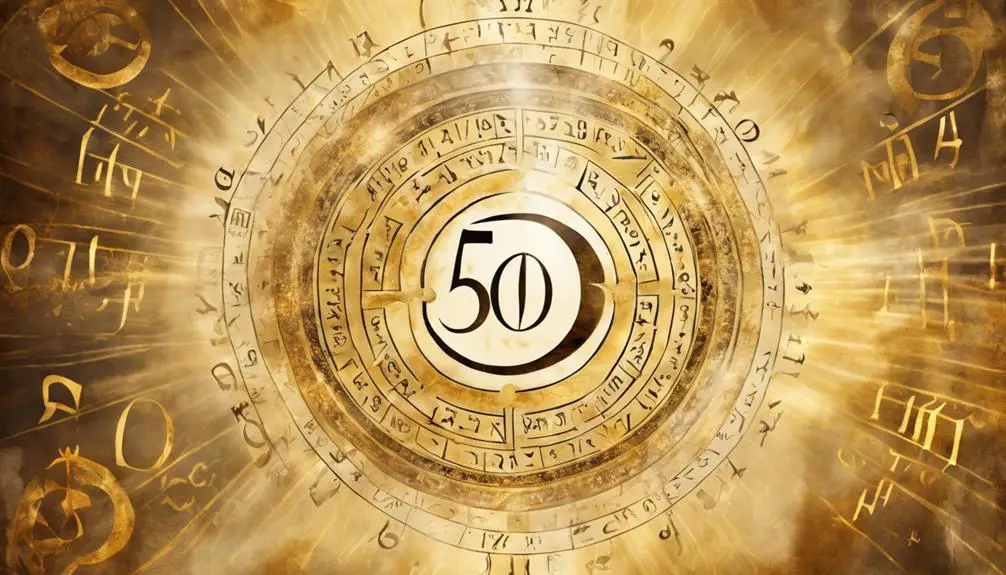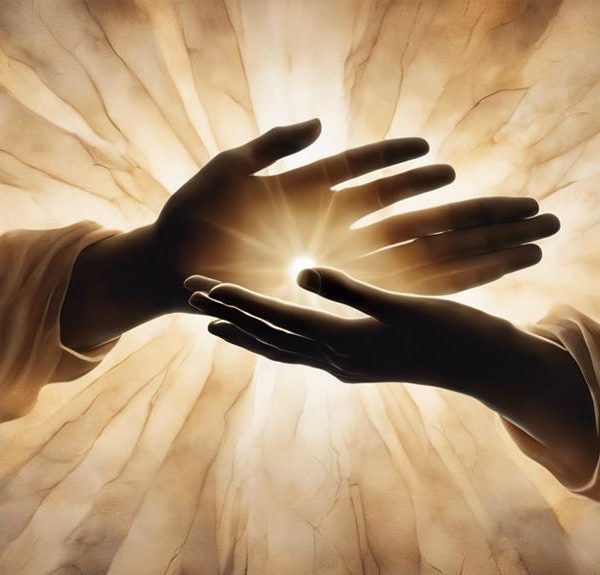Yearning to uncover ancient secrets, discover why the number 50 in the Bible heralds freedom, renewal, and divine intervention.

Meaning of Number 50 in the Bible
Have you ever wondered why the number 50 holds such significance in the Bible?
It's not just a random figure; it embodies themes of freedom, renewal, and divine promise.
From the Jubilee Year, which symbolizes liberation and new beginnings, to Pentecost, marking the descent of the Holy Spirit, the number 50 weaves through biblical texts as a thread of hope and transformation.
Its presence in temple rituals and prophetic patterns further underscores its deep spiritual resonance.
Unpacking its layered meanings offers a rich tapestry of insights, beckoning you to explore how these ancient principles resonate in contemporary life.
Key Takeaways
- The number 50 symbolizes a period of liberation, debt forgiveness, and land restoration during the Jubilee Year.
- Pentecost, occurring 50 days after the Resurrection, signifies the birth of the Church through the Holy Spirit's empowerment.
- In biblical narratives, 50 represents freedom and deliverance, highlighting God's mercy and justice in the Jubilee Year.
- Temple rituals using the number 50 emphasize purification, renewal, and the significance of sacred spaces.
Jubilee Year Significance

In the biblical context, the number 50 holds profound significance as it marks the Jubilee Year, a time of liberation and restoration for the land and its people. This period, detailed in Leviticus 25, demands a halt in agricultural activities to allow the land to rest and rejuvenate, embodying the principle of land restoration. It's a year where the inherent value of nature and its sustainable management is highlighted, underscoring the necessity for periods of non-interference to ensure environmental balance and fertility.
Furthermore, the Jubilee Year encompasses the pivotal practice of debt cancellation. Debts are erased, and those who've sold themselves into servitude to repay debts are granted freedom, returning home to their families. This practice ensures a reset of economic disparities, preventing the perpetuation of poverty and fostering a more equitable society. It's a radical approach to socio-economic challenges, emphasizing the importance of community and mutual support.
The essence of Jubilee is deeply transformative, advocating for a society where freedom, economic justice, and environmental stewardship are interlinked. It's a visionary model that challenges contemporary approaches to debt, land management, and social equity, demonstrating the timeless relevance of biblical principles.
Pentecost and Renewal

Shifting focus from the Jubilee Year, the number 50 also ushers in the celebration of Pentecost, a pivotal moment marking the renewal of faith and the empowerment of the early church. This significant event, occurring 50 days post-Resurrection, symbolizes not just a period but a transformative experience for the believers. It is here that the Holy Spirit descends, marking the Church Birth, and equipping the apostles with gifts that would enable them to spread the gospel across the globe.
Aspect |
Detail |
Impact |
|---|---|---|
Holy Spirit |
Descent |
Empowers believers |
Timing |
50 Days After |
Marks a period of renewal |
Outcome |
Church Birth |
Spreads gospel worldwide |
This table succinctly highlights the critical components of Pentecost and their lasting effects on Christianity. The descent of the Holy Spirit not only empowered the apostles but also signaled the birth of the Church, a cornerstone in Christian faith. This moment of divine intervention served as a catalyst for renewal, propelling the message of Jesus Christ across continents. Pentecost, therefore, is not merely an event but a watershed in religious history, embodying the essence of faith renewal and the formidable establishment of the Church.
Freedom and Deliverance

Exploring further the symbolic significance of the number 50 in biblical contexts, we now turn our attention to its association with themes of freedom and deliverance. This connection isn't incidental; it's deeply rooted in the very fabric of biblical narrative and law fulfillment.
When you delve into the scriptures, you'll find that the Year of Jubilee, which occurs every 50 years, serves as a profound emblem of liberation and restoration. It's a time when slaves are freed, debts forgiven, and lands returned to their original families.
This cyclical event underscores a divine mandate for social and economic rebalancing, embodying the principle of freedom as a God-given right. It's a covenant celebration, a divine decree that ensures no one remains in perpetual bondage, whether spiritual, physical, or financial.
The Jubilee year transcends mere ritual; it's a tangible expression of God's mercy and justice, demonstrating His desire for His people's holistic deliverance.
Symbolism in Temple Rituals

Delving deeper into the symbolic significance of the number 50, it's crucial to examine its role within temple rituals, where it embodies themes of purification and renewal. Within the intricate framework of temple measurements and sacrificial practices, the number 50 stands out, not just as a numerical value, but as a profound symbol of a spiritual journey towards sanctification.
Aspect |
Significance |
|---|---|
Temple Measurements |
In the dimensions and architecture, 50 cubits often demarcate sacred spaces, symbolizing God's perfection and the completeness of the divine-human relationship. |
Sacrificial Practices |
Every 50 years, the Jubilee year mandated the liberation of slaves and the return of lands, reflecting themes of redemption and new beginnings in the communal relationship with God. |
This deliberate use of the number 50 within temple rituals underscores a theological narrative that transcends mere ceremonial observance. It's a testament to the Bible's intricate symbolism, where numbers serve not only as quantifiers but as bearers of deep spiritual truths. Through the lens of temple rituals, you're invited to see the number 50 as a beacon of hope and divine grace, intricately woven into the fabric of biblical faith.
Numerical Patterns in Prophecy

In the realm of biblical prophecy, numerical patterns offer a unique lens through which you can uncover layers of meaning and divine intention. These patterns aren't arbitrary; they're woven into the fabric of the scriptures with precision, serving as markers of time cycles and indicators of prophetic accuracy. You'll find that the Bible meticulously records events and timelines, often tied to specific numbers that carry deeper significance.
Delving into these numerical patterns, you realize they're not just historical footnotes. They're a testament to the forethought and meticulous planning that underpin the biblical narrative. For instance, the number 50, associated with the Jubilee year, underscores themes of liberation and renewal—concepts that reverberate through prophetic messages.
This analytical approach allows you to appreciate the Bible's prophetic literature in a new light. The patterns reveal a divine architect at work, using numbers as a language to communicate with humanity. It's a method that enhances the credibility of the prophetic texts, as the fulfillment of time-specific prophecies lends weight to their claims.
Understanding these numerical patterns enriches your grasp of biblical prophecy, spotlighting the intricate relationship between time cycles and divine revelation. It's a journey into the heart of scripture, where numbers serve as keys unlocking the depth of God's messages to the world.
Frequently Asked Questions
How Does the Concept of Forgiveness Tie Into the Biblical Significance of the Number 50, Outside of the Jubilee Year Context?
You're diving into how forgiveness frequency ties to numerical symbolism, beyond just jubilee years. This concept highlights a deeper layer of understanding.
Essentially, the number 50, even outside jubilee contexts, symbolizes freedom and the act of letting go, aligning closely with forgiveness. It's about cycles of renewal and opportunities for fresh starts.
The emphasis here is on the power of forgiveness as a transformative force, resonating through the symbolism of 50.
Are There Any Specific Biblical Figures or Stories That Are Directly Associated With the Number 50, Which Are Not Related to Pentecost, Jubilee, or Temple Rituals?
You're looking for biblical instances tied to the number 50, beyond the well-known contexts.
Two notable mentions are Noah's Ark and Abraham's Negotiation.
In Genesis, Noah's Ark symbolizes a fresh start, but it doesn't directly connect to the number 50.
Similarly, Abraham tries negotiating with God about Sodom, starting at 50 righteous people.
Neither story explicitly ties to the number's meaning but showcases pivotal moments of faith and divine interaction.
How Has the Interpretation of the Number 50's Significance Evolved in Modern Christian Thought, Beyond Its Original Biblical Meanings?
You're exploring how modern Christian thought has expanded the interpretation of numerical symbolism, specifically the number 50, beyond its ancient biblical roots.
Today, it's not just about historical narratives; it's about personal and communal milestones, reflecting a broader spiritual journey. Modern interpretations dive into psychological and societal layers, seeing it as a symbol of grace, freedom, and new beginnings.
This fresh perspective enriches the traditional understanding, making it more relevant to contemporary life.
In What Way Does the Number 50 Relate to the Concepts of Personal Transformation or Spiritual Awakening in Biblical Narratives, Excluding Pentecost and Jubilee Year Events?
You're exploring how the number 50 signifies personal transformation or spiritual awakening, aside from Pentecost and Jubilee. In biblical narratives, this number often symbolizes renewal and marks spiritual milestones.
It's a figure denoting a period after which renewal or significant change is expected, embodying the idea that after a set time, transformation isn't just possible but anticipated. This interpretation underlines a deep-seated belief in growth and renewal within one's spiritual journey.
Can the Number 50 Be Found in Biblical Prophecy Outside of the Contexts Already Mentioned, and if So, How Is It Interpreted in Terms of Future Events or Revelations?
You're diving into whether the number 50 surfaces in biblical prophecy beyond the familiar narratives, focusing on end-time numerology and prophetic symbolism.
While not as prominently featured as other numbers, 50's interpretation in prophetic contexts is less direct but suggests a period of transition or anticipation.
It's vital to analyze texts carefully, as its significance might hint at broader themes of renewal or judgment in the unfolding of future events.
Conclusion
In conclusion, the number 50 holds profound significance in the Bible, symbolizing jubilation, renewal, and freedom. It's intricately connected to the Jubilee Year, Pentecost, and signifies liberation and divine deliverance.
Its presence in temple rituals and prophetic patterns further underscores its spiritual importance. As you've seen, this number isn't just a figure but a powerful symbol that weaves through biblical narratives, embodying hope, renewal, and God's promise of redemption.
Its repeated appearances underscore a divine design, offering deep insights into biblical teachings.



Sign up